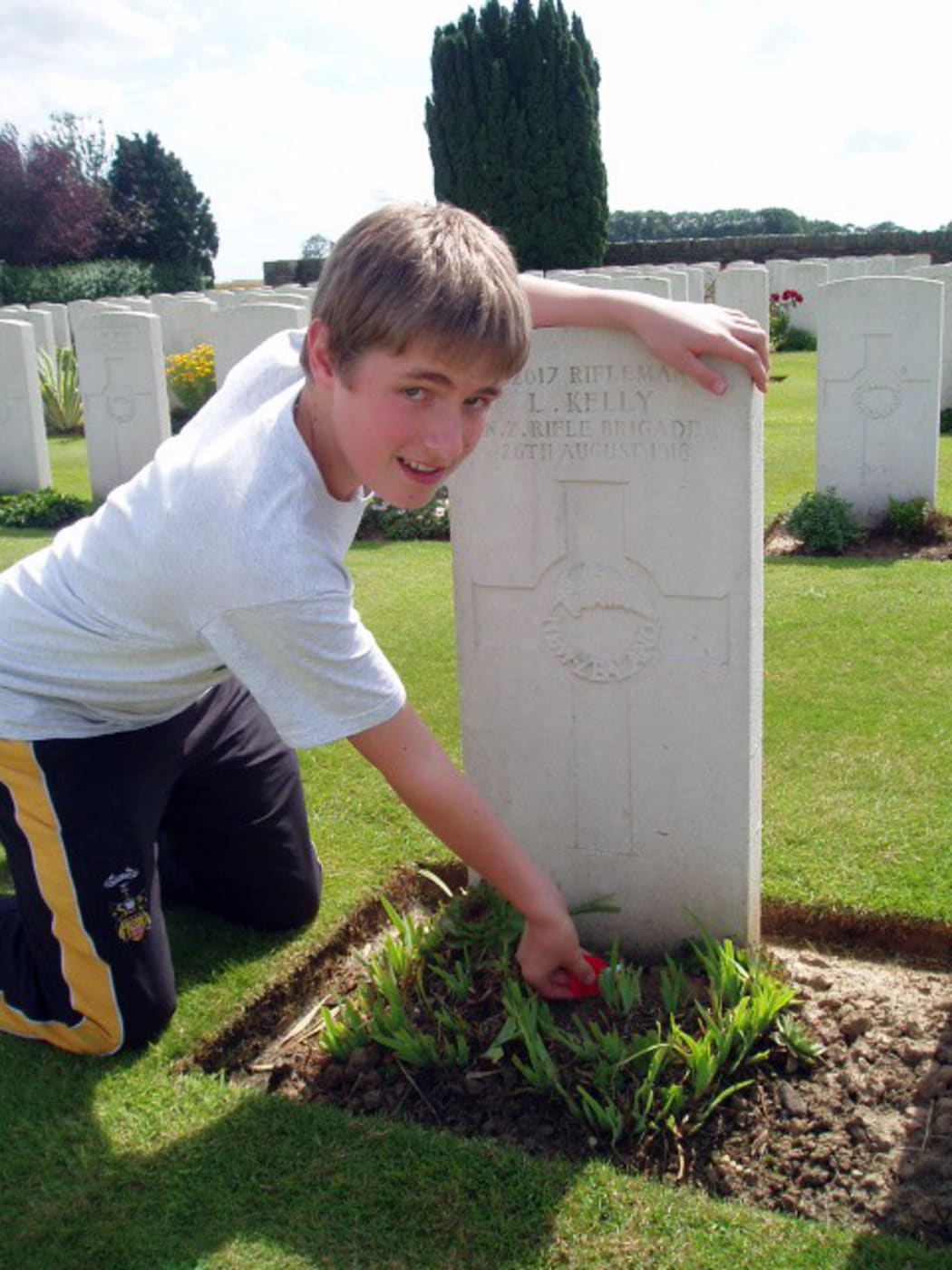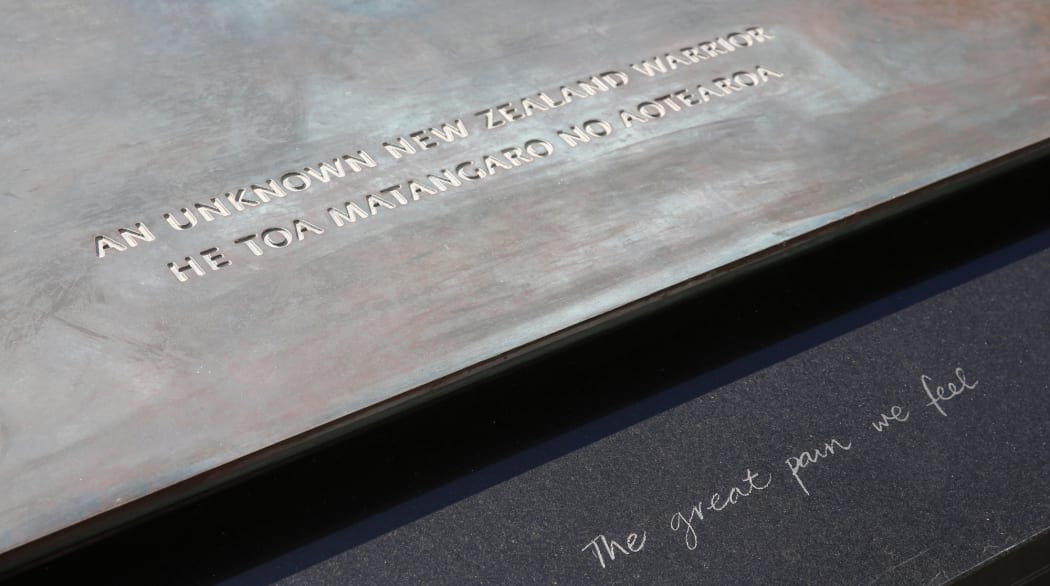What I remember most from Gallipoli is the heat, bearing down on me, boring through my skin. I was 16, there with 60 other adolescent boys on a school trip.
We went to a museum on a peninsula, filled with objects that had been unearthed from the battlefields of last century. There was a jacket worn by a French soldier, made with a thick wool weave that would keep the cold out in a blizzard. Apparently they had to wear them during the day – part of the decorum of the French army. Standing there in shorts, sweat dripping onto the floor from every pore, wearing the coat felt impossible. An order issued in another time, another world.

Robert Kelly, aged 16, at his great-great uncle's grave at Vaulx Hill Cemetery in France. Leslie Kelly was killde in the last 80 days of the war, after surviving the Somme and Paschendale, by a stray bullet, nowhere near active combat. Photo: Supplied
There were graveyards everywhere. The pain of the loss that had been experienced was overwhelming. We walked down into the water in Anzac Cover and faced back up the hill – though it was more of a cliff, really, a cliff that boys our age and older had to climb under fire almost 100 years ago.
We read the diaries of the New Zealanders who’d fought there and visited the battle zones and the campsites. We did a haka at Chunuk Bair, a pivotal peak captured by the Wellington Battalion, and made a Turkish toddler cry. We didn’t buy ice cream from the man who followed us in a van with a freezer in the back; we weren’t allowed to.
I felt connected with the youths who fought on those slopes strongly, almost tangibly. But it was to the French, Turks and British just as much as it was with the ANZACs. The First World War is important to me; it’s part of how I see myself as a New Zealander. But the centenary celebrations that have already begun tell a different story to the one I feel in my bones – and this version makes me uneasy.
Until 2018 at least, World War I will be remembered everywhere: in publications, exhibitions, dedicated museums and at public events, until we can’t think of it as anything but the most significant event in New Zealand’s history. Funding put towards the mass memorialisation is being used overwhelmingly to prioritise narratives surrounding WWI and its connection to the present day, to the point of building “life-sized replica trenches”. The problem is that with one (albeit hugely important) event being commemorated on so large a scale, the narrative of the nation’s past is becoming skewed.
My anxiety is not over people remembering the war, but about how it’s being done, which is to the exclusion of not only other landmarks and events in our country’s past, but even the strands and stories of WWI that don’t fit the dominant narrative. The collective memory of the New Zealand public is being bought.
With over $17 million already put towards the centenary by the Lottery Grants Board alone, and likely more to come, it’s hard for any other event or cause to get anywhere near the same airtime. So what is it about WWI that’s captured the collective consciousness, and been such a drawcard for public money?
It’s because it’s easy. It’s simpler to commemorate an event that can be presented as representing all of New Zealand than one which might challenge or outright disprove the message that Aotearoa has a clear identity. In the coming four years of commemorations, I doubt we’ll see much, if anything about the continuing disenfranchisement of Maori land, or the history of the extreme xenophobia directed towards Asian immigrants and residents – but both were happening here at the same time as WWI.
Focusing on our involvement in a conflict in the northern hemisphere presents a way to define New Zealand against an unspecified other, rather than forcing us to acknowledge the divisions that existed then and continue to exist now.
The image of New Zealanders and Australians working together on the stony ledges of the Gallipoli peninsula is palatable and uplifting. Most importantly, none of the people who were there are still alive to dispute the narratives that make claims on their behalf.
READ: Ben Allan never met his father’s father, who fought in World War I. One hundred years on, what are we to make of it all?
By over-emphasising the importance of one narrative of one event, we run the risk of making a habit of selective memory. WWI is significant, but putting it on so high a pedestal means it casts a shadow over everything else.

None of the people who fought in WWI are still alive to dispute the narratives that make claims on their behalf. Photo: Elle Hunt
By glorifying New Zealand’s experience of WWI we deny ourselves a rich and full, if sometimes uncomfortable understanding of the past, both about Aotearoa and the world. The French soldiers who died from heat exhaustion in their thick wool jackets haven’t appeared in any of our commemorations. But they were there on the hill too.
If we’re going to remember WWI, let’s do it more holistically. This stories that have so far gone untold might be confronting, but it’s essential to look at all the strands of our past in relation to each other. The next four years of the centenary is an opportunity to question what we commemorate and how, and to start a conversation about how we approach our past that isn’t defined by older generations’ perspectives. We can’t afford to simply inherit the narratives that are being passed down to us when there’s so much more pain and joy to be found in the history of this country.
This content is brought to you with funding assistance from New Zealand On Air.

